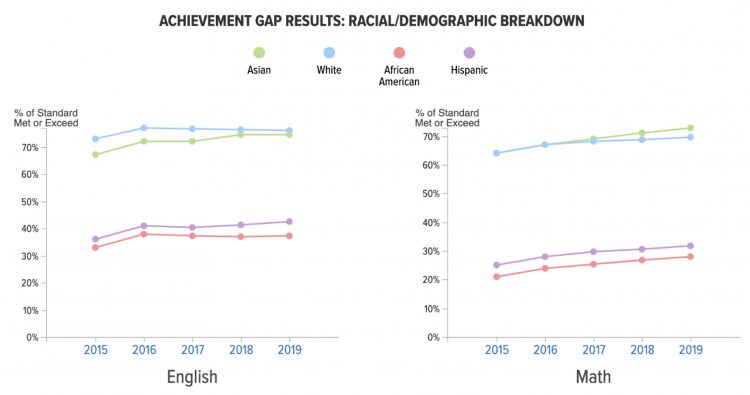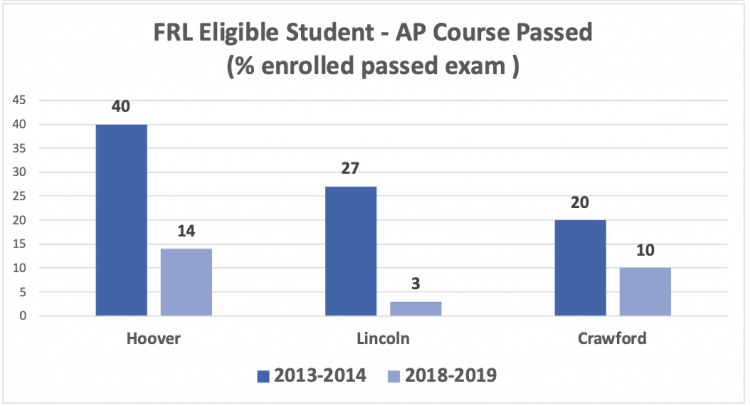By Tressa Pankovits
Supporters of Cindy Marten, President Biden’s nominee for Deputy U.S. Secretary of Education, laud her success in closing achievement gaps during her eight years as superintendent in San Diego. Unfortunately, such claims are false.
Linda Darling-Hammond, who led Biden’s transition team on education, cites Marten’s “enormous work” and “knowledge base on how to improve schools and close opportunity and achievement gaps” for poor and minority students as her lead qualification. When the Senate Health, Education, Labor, and Pensions Committee holds its hearing on Marten this Wednesday, it should scrutinize that claim.
For Marten’s supporters, her perceived success in closing achievement gaps overrides her failures elsewhere. But that success is fiction, as the graph below shows.

Marten’s supporters also point to her 2016 elimination of high school courses-like one called “Unifying Algebra”-that did not count toward the state’s college admission requirements. In an effort to increase college readiness, especially among low-income and minority students, all SDUSD students now must pass, with a “C” or better, classes required for entry into the University of California and California State University systems.
Sadly, the result of that change was more grade inflation than increased learning. According to published reports, the percentage of minority students making those grades “skyrocketed” by 27% for Black students and 32% for Latino students. The percentage of all students graduating with a C or better in each of the A-G courses increased 24% since 2015. On its face, this is terrific news.
But those grades did not match student performance on standardized tests. On state exams, all three high schools in one of the city’s high-highest poverty areas finished 2019 with more students failing to meet state math standards than in 2016.
The disparity between classroom grades and test scores did not go unnoticed. At a January 29, 2019 board meeting, district staff made the case for switching from a decentralized grading system in which teachers could give (or take away) credit for measures such as tardiness, classroom behavior, and homework completion to one that would rest solely on academic mastery.
The presentation included 2018 SAT scores of students with at least a 3.5 weighted grade point average, contrasted with letter grades awarded in its high schools. It was a tacit admission that, despite the policy for which Marten received so much praise, classroom grades weren’t lining up with students’ proficiency in subjects needed to be successful in college.
One SDUSD high school vice-principal, quoted in a 2019 report by the University of California Los Angeles, explained, “I think there are a lot of teachers in the district that think equity means going easy on kids, and I actually think that’s one of the worst things in terms of systemic racism.”
About his time as a teacher at Lincoln High School, he admitted feeling terrible about passing “kids who couldn’t write a paragraph, because I felt so much social pressure from teachers.”
Marten also earned kudos for increasing the percentage of Black and Latino students who took Advanced Placement (AP) courses (which count for college credit if students take and pass an associated exam). While those percentages shot up, the percentages of low-income students taking and passing AP exams plummeted in the city’s high poverty high schools, as the graphs below show.


Progressive Policy Institute
In San Diego, Marten was criticized for “jamming more kids in AP classes” to show increasing educational opportunity but failing to support changes in instructional practices that would actually help low-income students earn free college credits.
At her 2013 inaugural “state of the district” superintendent’s address, Marten wowed attendees by stepping into a high-heeled pair of ruby “slippers” and clicking her heels three times while promising that every student would soon attend a high-quality neighborhood school. Despite her supporters’ spin, however, her track record with the city’s most vulnerable students is one of a gap entrenched.
Now, Marten doesn’t want to go home. She wants to go to Washington D.C. to assume an enormously powerful position, overseeing the development of education policy, programs, and activities for the nation. Her record on SDUSD’s achievement gap, ostensibly her prime credential—coupled with other well-documented leadership missteps—makes this a bad idea.
Senators on both sides of the aisle will likely enjoy Marten’s legendary charm, but they should do what the Biden administration has advised in other arenas: follow the data.
Originally published by RealClearEducation. Republished with permission.








